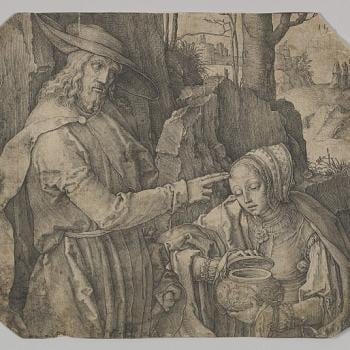 A couple of years ago Jan and I went to the Cambridge Cemetery to lay flowers on the graves of the James brothers, she with a small bouquet for Henry and me with a rose for William. After we lay our flowers on the graves and offered up our thanks for their contributions to world culture we turned around to walk back to our car. That’s when I noticed the headstone just across the way that had a large flaming chalice engraved on it. That’s unusual, I thought. And we walked over to discover the gravesite of James Luther Adams.
A couple of years ago Jan and I went to the Cambridge Cemetery to lay flowers on the graves of the James brothers, she with a small bouquet for Henry and me with a rose for William. After we lay our flowers on the graves and offered up our thanks for their contributions to world culture we turned around to walk back to our car. That’s when I noticed the headstone just across the way that had a large flaming chalice engraved on it. That’s unusual, I thought. And we walked over to discover the gravesite of James Luther Adams.
As it turns out James Luther Adams was born on this day in 1901.
Adams could reasonably be called the last great Unitarian (and probably the only great Unitarian Universalist) theologian. He based his own work on that of the eminent liberal Protestant theologian Paul Tillich but gave it a very Unitarian Universalist spin.
An early critic of the Nazis, while studying in Germany Adams helped organize against Hitler. Van Eric Fox and Alice Blair Wesley’s biographical sketch notes “In Germany during 1935-36, Adams watched as the Nazi government of Adolph Hitler ruthlessly crushed any and all dissent as it marshaled forces for its coming march across the continent. Interrogated by the Gestapo, he narrowly avoided imprisonment as a result of his engagement with the Underground Church movement. Using a home movie camera, he filmed Karl Barth, Albert Schweitzer and others, including those who were involved in clandestine, church-related resistance groups, as well as pro-Nazi leaders of the so-called German Christian Church. Adams returned to the United States more convinced than ever that the tendency of religious liberals to be theologically content with vague slogans and platitudes about open-mindedness could only render liberal churches irrelevant and impotent in face of the world’s evils, and he stated his convictions loudly and frequently.
Returning to the United States he was a tireless worker helping to organize the Commission on Appraisal as a reform activity of the American Unitarian Association. Their first great project the 1936 report Unitarians Face a New Age is considered one of the first articulations of what would become our contemporary liberal religious perspective.
He served as a parish minister first in Salem and later in Wellesley Hills, but is best known as a teacher, first at Meadville (before it became Meadville Lombard) and later at Harvard and Andover Newton. His writings included studies of Tillich and his own theological reflections including The Prophethood of All Believers and An Examined Faith.
I love that he started out life as the child of a fundamentalist Baptist preacher. His spiritual journey took him through what might be called “scientific humanism” particularly under the influence of John Dietrich, and eventually to a form of liberal Christianity possibly best designated “Christian humanism.” (If we don’t confuse it too much with the Christian humanism of the Enlightenment).
Adams gave particular attention to how we gathered together and what that meant. Fox and Wesley write “Adams’s conception of the meaning and importance of voluntary associations grew directly from his understanding of authentically free spirit in the free church. He described the free church as a body of believers freely joined in a covenant of loyalty to the holy spirit of love, intentionally inclusive of dissent, governed by its own members and fiercely independent from government control, with the reign of the spirit of love among members to be seen in their voluntary assumption of responsibility for the just character of their whole society.
“He came to see the idea of the free church as the root idea of the Judeo-Christian tradition of which Western civilization is the fruit, especially as it is manifest in the deliberate and carefully preserved limitation of the government’s power to control thriving, independent voluntary associations in a democratic society. He interpreted participation in voluntary associations, whatever the character of the government, as the chief means by which beneficial social change has been effected throughout history, and as key to the meaning of human history.
“To Adams, the notion that any group might hold a monopoly on the spirit of love was preposterous and idolatrous. In the Western world, the free church provides the historical model for many other voluntary associations, whose purpose is to maintain high standards or to promote constructive change. As a theologian, Adams was interested in voluntary associations because his experience and his studies had brought him to the belief that through voluntary participation in groups humanity may respond in all times to ‘the community-forming power’ of God’s love, present in and available to every human heart and mind.”
I believe that this view of a faith that is gathered in covenant rather than under creed has become the central organizing principal of contemporary western liberal religion. And it was Adams who first, or at least, most cogently presented this perspective.
The great humanist Edwin Wilson observed that he thought Adams believed in “salvation by bibliography.” This probably was not meant entirely kindly. But Adams loved it and repeated it endlessly about himself. James Luther Adams was a scholar, a spiritual Humanist of the Christian flavor, and a central figure in the formation of contemporary Unitarian Universalism.
May blessings rest upon his name.












